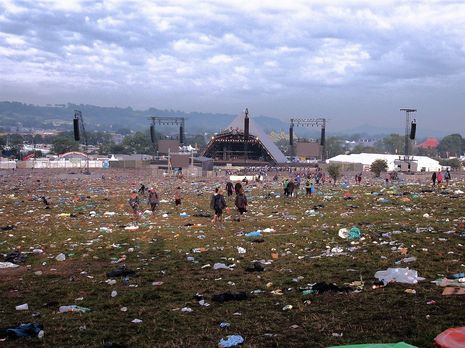Sustainability in the music industry
Isabel Sebode explores the issue of sustainability in concerts and touring and discusses some of the measures being taken to make the industry greener

As music is intangible, we often forget that it too leaves an imprint on our environment, and that the fashion, technology or energy industries are not the sole culprits. Besides the considerable emissions brought about by streaming music (estimated in 2019 to be around 200 to 350 million kilograms of greenhouse gas emissions across the 2000s), touring and concerts are proving to be a significant strain on the environment. In an era in which the environment has become an undeniable socio-political concern, touring, concerts and festivals are valuable experiences, yet unwarrantable. Or so we might think.
‘What can a band do when passion, economics and the environment exist in mutually exclusive relationships?’
To stop touring all together seems to be the only ethical response towards a burning world, in which all of our consumption has the potential of inducing guilt. Yet, whilst Coldplay can afford to not tour, smaller bands need live performances for exposure, as interacting with the audience is the only way a real profit can be made, and a reputation established. Artists and record labels get less than half of profits made from online streaming of their music and, accompanied by a reduced consumption of CDs, concerts seem to be the only lucrative option. But what can a band do when passion, economics and the environment exist in mutually exclusive relationships?
The company REVERB has become aware of this problematic dynamic, directing its business model towards making touring an accessible, sustainable and preserved aspect of our creative culture.
’These ‘reformed’ concerts show us that sustainability and ethics are capable of being part of our daily life’
REVERB aims to “partner with Musicians, Festivals and Venues to green their concert events while engaging fans face-to-face at shows to take environmental and social action.” Their strategies include helping artists to implement basic measures, such as the elimination of single-use water bottles from events, or more complex changes such as encouraging bands to use biofuels in their tour buses. REVERB helps artists understand that a lack of awareness of sustainability is clearly a problem at every stage of the event – before, during and after.
The Forest Hills Stadium is one of REVERB’s fully sustainable venues, in which 16,400+ Single-Use Plastic Water Bottles have been eliminated, and $1,452 has been raised for local non-profit organisations. REVERB has acknowledged the importance of concerts as a source of entertainment, with the potential of integrating a social conscience into personal enjoyment. These ‘reformed’ concerts include donation and climate action into experiences that we already engage with, showing us that sustainability and ethics are compatible with our daily life.
‘Let us do our best to offset the damage and learn about alternatives, rather than restrict culture and enjoyment in fear’
We are moving towards a time in which concerts will no longer be spaces that cause plastic masses to form alongside an audience’s carelessness; towards an end of entertainment without perceived consequences. The festival Lollapalooza, the recipient of the 2017 Illinois Sustainability Award, demonstrates how music and ethics have become intertwined, as the festival prioritises sustainability in its events without the help of firms such as REVERB. In its 2018 Environmental Impact Report, Lollapalooza records achievements such as offsetting 2.4 million pounds of CO2 emissions, recycling 145.6 tons of recyclable materials and avoiding 1,119,276 plastic bottles due to its refilling stations. Not only do these numbers make the festival-goer aware of the potential damage caused by festivals, but the prospect of offsetting waste through simple exchanges becomes more feasible, allowing live music to remain a guilt-free enjoyment.
Endeavours such as these demonstrate a movement towards offsetting further damage without compensating culture. Whilst music events will never be 100% zero waste or carbon emission-free, rarely anything we do can be. Even the fact that our regular streaming of music on Spotify can be linked to carbon emissions expresses the demoralising awareness that all we can do is reduce, not eliminate. Instead, these events and concerts should encourage environmental mindfulness. Venues are transformed into places of entertainment as well as education, teaching the festival-goer about manageable behaviours that make us just a bit kinder towards the world we live in. Let us do our best to offset the damage and learn about alternatives, rather than restrict culture and enjoyment in fear. An environmental conscience should become part of the festival and concert experience, allowing music and nature to thrive.
 News / Deborah Prentice overtaken as highest-paid Russell Group VC2 February 2026
News / Deborah Prentice overtaken as highest-paid Russell Group VC2 February 2026 News / Christ’s announces toned-down ‘soirée’ in place of May Ball3 February 2026
News / Christ’s announces toned-down ‘soirée’ in place of May Ball3 February 2026 Fashion / A guide to Cambridge’s second-hand scene2 February 2026
Fashion / A guide to Cambridge’s second-hand scene2 February 2026 News / Downing Bar dodges college takeover31 January 2026
News / Downing Bar dodges college takeover31 January 2026 Comment / Men at Cambridge are experiencing equality2 February 2026
Comment / Men at Cambridge are experiencing equality2 February 2026











